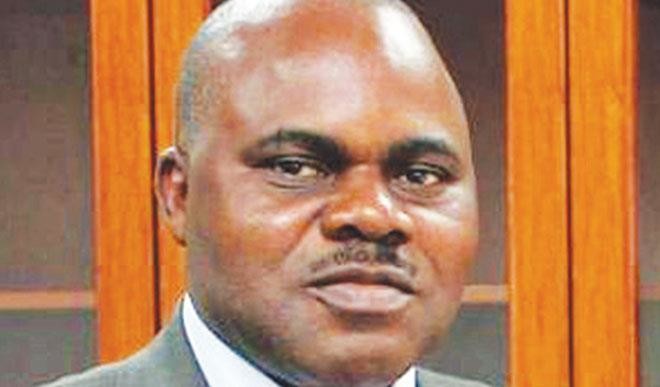Violating electoral laws is against human rights – Bem Angwe
The Executive Secretary of the National Human Rights Commission (NHRC), Professor Bem Angwe, has said the NHRC has not indicted any politician but only reported indictments contained in judgments made by elections tribunals and the court of appeal. The NHRC boss, speaking with the Daily Trust, weekend, said that everything contained in the NHRC independent […]


The Executive Secretary of the National Human Rights Commission (NHRC), Professor Bem Angwe, has said the NHRC has not indicted any politician but only reported indictments contained in judgments made by elections tribunals and the court of appeal.
The NHRC boss, speaking with the Daily Trust, weekend, said that everything contained in the NHRC independent report during the elections petitions process 2007 and 2011 were taken from court verdicts.
The 284-page report obtained by the Daily Trust was prepared by a Technical Working Group comprising top academics from Nigerian universities.
The team, led by Prof Nsongurua Udombana, also had Muhammad Akanbi, Oluyemisi Bamgbose, Ifeoma Enemuo, Mohammed Tawfiq and Dr Solomon Ukhuegbe as members.
The group was commissioned by NHRC as part of its efforts to check electoral malpractices and impunity to pave way for free, credible polls in the country.
In a communique issued at the end of the 56th Annual General Conference of the Nigerian Bar Association (NBA) held at Port Harcourt, Rivers State, the NBA advised the NHRC to stick to its statutory functions and stop usurping or attempting to usurp the statutory functions/duties of other government agencies.
Professor Muhammed Tawfiq Ladan, a member of the team, said yesterday during a telephone interview that the NHRC amended Act gave the Commission extensive powers not only to bark but also to bite.
The powers of the NHRC, he said, now included the power to make findings, summon any person or institution, investigate, study and to research.
“The functions and powers of the NHRC have changed,” he said.
“The report is an analysis of indictments in over 275 judgments of the election petition tribunals and the Court of Appeal, containing extracts in the full report of exact phrases from these judgments.”
Ladan advised lawyers to read the NHRC amended Act.
The NHRC said that it would formally issue a ‘White Paper’ on the report and make far-reaching recommendations to the attorney-general of the federation and minister of justice for prosecution of culprits.
Angwe said that it is with a view to bringing those indicted for violating electoral laws to book that the project was set up hence the commission conducted an independent review of evidence of violations of the rights to participate in government and fair trial through the election petition and judgments in the 2007 and 2011 elections in Nigeria.
Following the presentation of the initial report in 2014, he said that a preliminary list of the names of indicted persons and institutions was made available to the attorney-general of the federation and state attorneys general for further investigation and possible prosecution for electoral crimes.
He added that the list has been upgraded and would be sent to the attorney-general and states’ attorneys-general so that persons and institutions indicted would be held accountable for their infractions during the 2007 and 2011 elections.
He said: “Unless steps are strengthened to deal with electoral impunity, the right to vote and be voted for and related rights will continually be infringed upon with adverse consequences on democratic governance in the country”.
The NHRC boss said that political parties were critical stakeholders in the electoral process, urging them to be vigilant before presenting their candidates to INEC for election.
The Chairman of the Technical Working Group, Nsoguruwa Udombana, said: “From the initial review of the cases, the TWG identified 200 cases of various infractions of the right to participation in government. Out of these, at least 81 cases contained specific indictments against named persons or institutional actors, including INEC, some political parties and their agents.”
The first case reported emanated from Loko/Udege (Nasarawa West Constituency where the election petition tribunal recommended to the INEC that prompt and appropriate steps be taken to prosecute the first respondent for the offence of forgery in respect of West African School Certificate 03452 presented by him to INEC.
The case of Lagi Innocent and Another v. Yakubu Abdulhamid Kwarra and 43 others was also instructive as the court found that the 1st respondent presented a forged graduation certificate.
The court held: “The document speaks for itself, in view of the cogent and compelling evidence by the 1st petitioner. Therefore, a court of law or a tribunal cannot close its eyes to the infringement of the Constitution. Indeed we hold that the documents of the 1st respondent regarding his age and educational qualifications in exhibit PET 1 are evidently documents which ex facie and in substance are constitutionally illegal and statutorily void. This stands to reason because a candidate who seeks to contest an election is saying loud and clear to the electorate that he is worthy of trust which they repose on him. The electorate trust that candidate is a person of integrity, honest and whose behavior at all times is above board. To present a forged certificate to INEC betrays that trust and indeed a candidate guilty of such cannot be a material to be trusteed. He has lied to the very people he seeks to lead.”
In yet another case- Hon. Yahaya Saduki and Anor V. Abubakar Abdullahi and others, Petition No. SHA/EPT/NS/11/2007, the court held: “ Before we are done however, we seize the opportunity to deprecate in strong terms, the conduct of 1st respondent who in his bid to become a lawmaker in Niger State House of Assembly turned himself into a law breaker by signing the statutory declaration of his age when he was not the declarant.”
